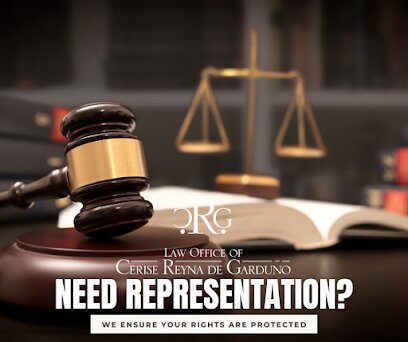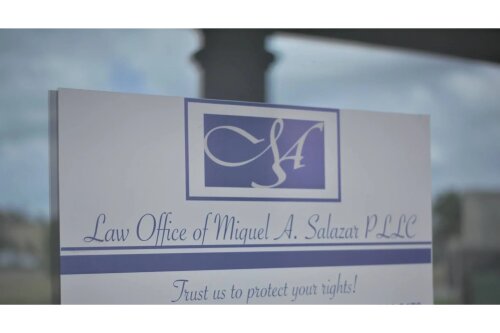Best Collaborative Law Lawyers in Brownsville
Share your needs with us, get contacted by law firms.
Free. Takes 2 min.
Free Guide to Hiring a Family Lawyer
List of the best lawyers in Brownsville, United States
About Collaborative Law in Brownsville, United States
Collaborative law is a private, voluntary process for resolving family law and other civil disputes outside of court. In Brownsville, which lies in Cameron County in the state of Texas, collaborative law is used by many couples and families who want to negotiate settlements on divorce, child custody, child support, spousal maintenance, and property division without formal litigation. The process is based on a signed participation agreement that commits the parties and their lawyers to resolving the matter through interest-based negotiation and cooperation. If the process succeeds, the parties execute a final settlement that can be filed with the appropriate court. If the process fails, the parties typically retain the option to pursue litigation, though the collaborative agreement may require the parties to hire new litigation counsel.
Why You May Need a Lawyer
Even though collaborative law emphasizes cooperative negotiation, you still need a lawyer for several important reasons. A lawyer trained in collaborative practice helps you understand your legal rights and obligations under Texas law, assesses options for child custody and support, evaluates property division and financial claims, prepares and reviews the participation agreement, and provides legal counsel during joint meetings. A lawyer can also help protect your interests while facilitating settlement, ensure any agreements comply with statutory requirements, draft settlement documents suitable for court filing, and advise on the consequences of proposed terms. Collaborative lawyers are also trained to work with neutral professionals such as financial neutrals and child specialists when those experts are needed.
Local Laws Overview
Collaborative law in Brownsville operates within the framework of Texas family law and the procedures of local courts in Cameron County. Key points to keep in mind:
- Texas family law governs divorce, child custody, visitation, child support, spousal maintenance, property division, and parental rights. Collaborative agreements must reflect and comply with substantive rules under state law where applicable.
- Court filing requirements - even when parties reach a collaborative settlement, certain steps are required to finalize a divorce or modify court orders. For example, the court must approve child custody arrangements and sign judgments to make them enforceable.
- Local courts - family law matters in Brownsville are handled by Texas state courts, including district courts and county courts at law that have jurisdiction over divorce and custody matters in Cameron County. Court rules and procedures for finalizing agreements or seeking temporary orders should be confirmed with the clerk or local counsel.
- Confidentiality and privilege - many collaborative processes include confidentiality provisions in participation agreements. However, confidentiality is contractual rather than absolute; certain communications may be discoverable or admissible in court if parties later litigate. Discuss confidentiality limits with your lawyer.
- Neutral professionals - collaborative law commonly uses neutral financial specialists and child specialists. Their role and expense-sharing should be agreed in advance and may be subject to local rules and standards of professional conduct.
Frequently Asked Questions
What is collaborative law and how does it differ from mediation or litigation?
Collaborative law is a structured negotiation process in which each party has independent counsel trained in collaborative practice, and everyone signs a participation agreement promising to resolve the matter without court litigation. In mediation a neutral mediator facilitates negotiation but parties may represent themselves or have attorneys who are not present for all sessions. In litigation, a judge decides disputed issues after court proceedings. Collaborative law emphasizes cooperation, transparency, and problem solving, and often involves neutral experts to address financial and child-centered issues.
Is collaborative law available for all family law issues in Brownsville?
Many family law matters can be resolved through collaborative law, including divorce, child custody and visitation, child support arrangements, asset and debt division, and spousal maintenance. However, cases involving immediate safety concerns, active domestic violence, or where one party cannot participate voluntarily or in good faith may not be appropriate for collaborative practice. Your lawyer can help assess suitability.
Do I need a special collaborative lawyer or can any lawyer handle the process?
Any licensed attorney can participate in collaborative cases, but collaborative law uses specific techniques and ethics commitments. Look for attorneys who have completed collaborative practice training or who advertise experience in collaborative law. A trained collaborative lawyer helps the process run more smoothly and protects your rights while encouraging settlement.
How does confidentiality work in collaborative law?
Confidentiality in collaborative law is usually defined by the participation agreement. Parties typically agree to keep communications and settlement discussions private, and to limit admissibility of those communications in court. However, confidentiality is contractual, not absolute - certain matters (for example, admissions of child abuse or threats to safety) may still have to be disclosed under mandatory reporting laws or applicable court rules. Talk to your lawyer about the scope and limits of confidentiality in your case.
What happens if the collaborative process breaks down?
Many collaborative agreements require that if the process fails, the parties and their collaborative attorneys withdraw from representing the parties in subsequent litigation, and each party must hire new litigation counsel. This rule protects the cooperative nature of the process but means you should be prepared for the potential need to retain new counsel if negotiations do not succeed.
How long does collaborative law usually take in Brownsville?
Timing varies by case complexity, the parties availability, whether neutral experts are needed, and how quickly needed information is produced. Simple cases can take a few months; more complex asset or custody disputes may take longer. Because collaborative law avoids court delays, many parties find it faster than traditional litigation, but there are no guarantees.
What are the costs of collaborative law compared with litigation?
Costs depend on attorney hourly rates, number of meetings, and use of neutral experts. Collaborative law can be less costly than prolonged litigation because it reduces court time and adversarial discovery. However, if multiple neutral professionals are engaged, costs can rise. Attorneys will usually provide an estimate of likely fees and may require retainers. Ask potential counsel about fee structures, likely expenses, and how costs are shared for neutral experts.
Can collaborative agreements be enforced by a court in Texas?
Yes. Once parties reach settlement terms, those terms can be put into a written agreement and submitted to the court for approval. When the court signs a final judgment or order incorporating the agreement, it becomes enforceable like any other court order. Until that point, the collaborative agreement itself is a private contract between the parties and their attorneys.
How do neutral professionals work in collaborative cases?
Neutral professionals are impartial experts hired jointly by the parties to address specialized matters, such as financial valuation, tax consequences, or child adjustment. Using neutrals saves time and expense compared with each party hiring separate experts, promotes a shared understanding of complex issues, and supports collaborative solutions. Participation agreements typically describe how neutrals are selected, their scope, and how their fees are divided.
How do I find a collaborative lawyer in Brownsville?
Start by contacting the local bar association or state bar referral service and ask for attorneys experienced in collaborative law. Look for lawyers who have completed collaborative practice training or who are members of collaborative law groups. You can also request an initial consultation to discuss the lawyer's collaborative experience, fees, and how they would handle your case. If you qualify based on income, legal aid organizations may provide referrals or services.
Additional Resources
Below are resources and organizations that can help you learn more about collaborative law or find assistance in Brownsville:
- Cameron County courts and district clerk offices - for information about local family court procedures and filing requirements.
- Texas Bar Association - for lawyer referrals, ethics guidance, and public resources on family law and dispute resolution.
- Local bar associations such as the Cameron County Bar Association - for referrals to attorneys who practice in the Brownsville area.
- Collaborative law organizations in Texas - statewide or regional collaborative practice groups often list trained practitioners and provide educational materials.
- Legal aid providers serving the Rio Grande Valley - for example, organizations that offer free or low-cost legal help for qualifying low-income residents.
- Texas State Law Library and Texas Family Code resources - for access to statutes and explanations of state family law rules.
Next Steps
If you are considering collaborative law in Brownsville, here is a practical checklist to move forward:
1. Gather basic documents - financial records, property information, income statements, and any court orders that currently affect your situation.
2. Research and contact attorneys - look for attorneys with collaborative law training and schedule initial consultations to discuss the collaborative process and fees.
3. Ask key questions at the consultation - about the lawyer's collaborative experience, expected timeline, likely costs, how neutrals are used, confidentiality limits, and what happens if the process fails.
4. Evaluate fit - collaborative law works best when both parties are willing to negotiate in good faith. If safety or coercion is a concern, consider other options.
5. Sign a participation agreement - if you and the other party agree to collaborate, your attorneys will prepare a participation agreement that sets out the ground rules, confidentiality provisions, fee arrangements, and the role of any neutral experts.
6. Prepare for joint meetings - organize documents, identify priorities and interests, and be ready to engage in constructive negotiation supported by your lawyer.
7. Finalize and submit agreement to court - when an agreement is reached, your lawyer will draft settlement documents and guide you through filing and obtaining a court order if needed.
8. If you cannot afford private counsel - contact local legal aid organizations or the state bar referral service to learn about eligibility for free or reduced-cost legal services.
Getting effective legal help early improves the chances of a successful collaborative outcome. If you are unsure where to begin, start with a consultation with a local attorney experienced in collaborative practice to discuss your options and tailor a plan to your circumstances.
Lawzana helps you find the best lawyers and law firms in Brownsville through a curated and pre-screened list of qualified legal professionals. Our platform offers rankings and detailed profiles of attorneys and law firms, allowing you to compare based on practice areas, including Collaborative Law, experience, and client feedback.
Each profile includes a description of the firm's areas of practice, client reviews, team members and partners, year of establishment, spoken languages, office locations, contact information, social media presence, and any published articles or resources. Most firms on our platform speak English and are experienced in both local and international legal matters.
Get a quote from top-rated law firms in Brownsville, United States — quickly, securely, and without unnecessary hassle.
Disclaimer:
The information provided on this page is for general informational purposes only and does not constitute legal advice. While we strive to ensure the accuracy and relevance of the content, legal information may change over time, and interpretations of the law can vary. You should always consult with a qualified legal professional for advice specific to your situation.
We disclaim all liability for actions taken or not taken based on the content of this page. If you believe any information is incorrect or outdated, please contact us, and we will review and update it where appropriate.










